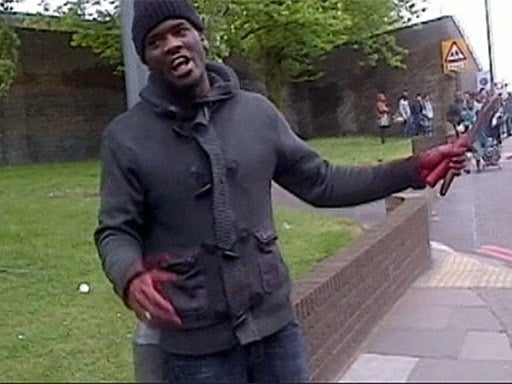Lee Rigby murderer Michael Adebolajo will die in prison after having appeal attempt quashed
The right for him to appeal his whole-life jail sentence was refused

Michael Adebolajo, one of two Islamic extremists who butchered Lee Rigby on the streets of Woolwich, will die behind bars after an attempt to challenge his sentence was quashed.
The murderer’s application for leave to appeal his whole-life sentence was rejected by Lord Chief Justice Lord Thomas today.
Sitting at the Court of Appeal in London with Lady Justice Hallett and Mr Justice Openshaw, he threw out arguments made by Adebolajo’s legal team.
Members of Fusilier Rigby's family, who were in court for the ruling, gasped with relief and shed tears of relief as the decision was announced.
His fiancée, Aimee West, said: "I am relieved and thankful with the outcome of today's hearing.
"I hope that this is the last we will hear from them both, so that I can focus on rebuilding my life and keeping Lee's memory alive."
Lawyers for his accomplice, Michael Adebowale, also failed in their attempt to reduce his 45-year life sentence. Lord Thomas said it was "just" punishment for the "horrific and barbaric" murder.
"They inflicted upon the family of Fusilier Rigby suffering extremely difficult to describe, and something they must live with for the rest of their lives," he added.
Mr Justice Sweeney ruled at the time that Adebolajo's was a “rare case” which warranted a whole-life term.
Explaining his decision, the judge said the 29-year-old, who has two children and four stepchildren, was the leader of the murderous plot and had “no real prospect of rehabilitation”.
However, 22-year-old Adebowale's younger age, mental health problems and “lesser role” meant that he escaped spending the rest of his life behind bars.
Whole-life terms came under the spotlight recently when leading judges at the Court of Appeal ruled that murderers who commit the most “heinous” of crimes can be sent to prison for the rest of their lives.
The Lee Rigby trial was delayed for two months until the specially-constituted court declared that sentencing judges can continue to impose “whole-life” tariffs in such cases.
It followed a clash between the Government and the European Court of Human Rights over whether “life should mean life” for the most serious offences.
Adebowale and Adebolajo, both British-born Muslim converts, ran 25-year-old Fusilier Rigby down in a car before hacking him to death with a meat cleaver and knives in a frenzied attack in May last year.
They encouraged witnesses to film the brutality, with Adebolajo giving a rambling speech while covered in blood saying it was revenge for British involvement in the Iraq and Afghanistan wars.
A report released last month by the Parliamentary Intelligence and Security Committee (ISC) found that the murder could not have been prevented, despite chronicling a catalogue of missed opportunities by police and the security services, who had been monitoring the killers for years.
Fusilier Rigby’s family accused Facebook of having “blood on its hands” by failing to help stop his death by alerting authorities to extremist messages written by Adebowale.
His sister, Sara McClure, told the Sun: “Facebook have my brother's blood on their hands.
“I hold them partly responsible for Lee's murder.”
The report had slammed an unnamed internet company, revealed to be Facebook, as a “safe haven for terrorists” who use it to plot attacks and share extremist material.
In December 2012, one such conversation between Adebowale and an Al Qaeda extremist went unreported, six months before the attack.
“Let’s kill a soldier,” he wrote in a series of “graphic and emotive” messages to the Yemen jihadist, where they discussed a choice of weapons and the challenges of being a “martyr”.
The parliamentary watchdog's chair, Sir Malcolm Rifkind, stated that Facebook could have made a difference by raising the conversation and there was “a significant possibility that MI5 would have been able to prevent the attack” as it would have made Adebowale “a top priority”.
The ISC found the information could have saved the soldier’s life but Adebowale and Adebolajo had already been on the radar of MI5 and the police for years by the time they committed their savage murder.
In the wake of the report, David Cameron announced £130 million in funding to improve the agencies' capability to combat “self-starting” terrorists and attacked internet firms for failing to help tackle the threat.
Additional reporting by PA
Bookmark popover
Removed from bookmarks